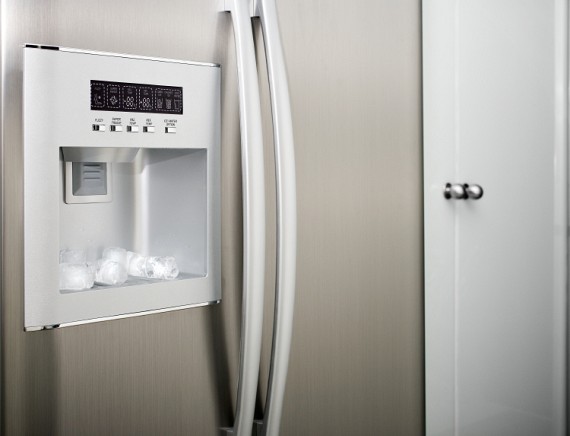What Makes a Fridge Stop Working?

While homeowners rarely give it much thought, the fridge is probably the most reliable machine we own. What else runs continuously for years, sometimes decades, without a breakdown? Ok, so maybe yours has quit, but it might help to think about how long it was working for you till now.
In any case, now you have to figure out why it quit. As a whole, refrigerator problems can make for a hefty troubleshooting guide, but here we’ll focus on the likely cause of a unit that’s simply gone kaput. Maybe the light works, maybe it doesn’t. But the fridge is definitely not cooling or freezing your food.
How Refrigerators Work
A refrigerator works on the same basic system as an air conditioner in your house or car. A closed loop of refrigerant absorbs heat and humidity from the interior storage compartments (mostly in the freezer) and passes through a series of coils that draw off and dissipate the heat into the air. A compressor makes the heat transfer possible and repeatable, by changing the refrigerant from a gaseous to a liquid form. What you hear when your refrigerator “kicks on” is the compressor motor running the compressor.
What Make a Fridge Stop Working?
Refrigerators also have several components, such as thermostats, timers, overload switches and fans, to facilitate the cooling process and keep everything working properly. Automatic-defrost units include heaters that cycle on and off automatically to prevent frost buildup. Failure of any of these components or systems can make your fridge stop working.
If Your Fridge Has Stopped And The Light is Off
As obvious as this sounds, often a fridge shuts down completely because it’s simply getting no power.
The first thing to check is the breaker (in your home’s electrical service panel) of the circuit serving the fridge. Most homes have a dedicated 20-amp circuit for the fridge alone, while older homes may have it on a general kitchen circuit. Turn the breaker back on (or replace the fuse) if you find that it has tripped.
Check the outlet the fridge is plugged into (which is probably behind the fridge) if it’s not the breaker, or you’ve reset a tripped breaker and there’s still no power. Plug a lamp into both sides of the outlet to test it. No power likely indicates the outlet is bad or a circuit wire has come loose.
Finally, check the power cord to the fridge for damage. Make sure that the appliance is unplugged first.
If Your Fridge Has Stopped but the Light Still Works
If the light goes on, you at least know the fridge is getting power. There are a few things you can try before calling a repairperson:
1. Turn down the freezer’s temperature setting to see if the fridge kicks on. Lowering the temperature in the refrigerator compartment isn’t a good test, because many refrigerators are chilled via vents from the freezer.
2. Make sure there is sufficient airflow around the fridge. You should have at least 3 inches of air space at the back and 1 inch at the top to help dissipate heat from the coils. Insufficient space can overheat the compressor, causing the fridge to shut down.
3. Clean the exterior coils, following the manufacturer’s instructions — this is also to prevent overheating.
4. Test the compressor by unplugging the fridge for about 2 hours, then plugging it back in. If the compressor starts up, chances are something is making it overheat.
Beyond trying these diagnostic tests, you’ll probably need to call a repair technician, who may test the following devices: compressor relay and overload protector, temperature controls, defrost timer, and evaporator fan.
If You Hear the Motor But the Fridge Won’t Cool
If it seems like the compressor motor is running, or it’s humming or making some kind of noise, but the fridge isn’t cooling at all, it’s time to call a service pro. Be sure to ask whether it’s best to unplug the fridge while you wait for the service call.
If everything looks normal but the cooling performance is poor, there are a number of things you can check for and possibly remedy yourself. For these, consult your owner’s manual.
Whatever You Do, Keep the Cold In
Regardless of the problem, you can greatly forestall food thawing and spoilage by opening the doors as little as possible. Every second with the doors open raises the temperature in the fridge and freezer compartments.
Looking for a Pro? Call us (866) 441-6648

Plumbing Average Costs
Plumbers Experiences

Pool Wiring Repair Eliminates A Potential Hazard

Whole House Fan Installation Saves Me Money On Electricity



